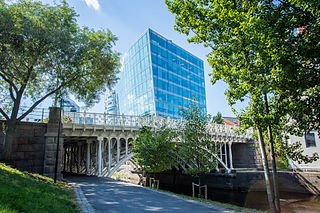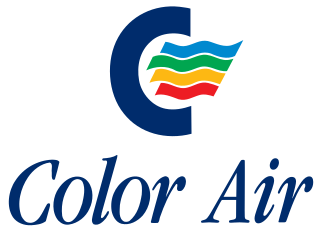Related Research Articles
Braathens ASA, until 1997 Braathens South American & Far East Airtransport A/S and trading as Braathens SAFE, was a Norwegian airline which operated from 1946 until it merged with Scandinavian Airlines (SAS) in 2004 to become SAS Braathens. For most of its history, Braathens was the largest domestic airline in Norway, but did not operate an international network for many years. Its main hubs were Oslo Airport, Fornebu and later Oslo Airport, Gardermoen, and briefly Stockholm-Arlanda Airport. The airline operated 118 aircraft of 15 models, mostly Boeing 737 variants. Braathens served 53 airports and 50 cities with scheduled services through its history.

Busy Bee was an airline which operated in Norway between 1966 and 1992. Entirely based around wet lease, it conducted a mix of regional services for larger airlines and the military, as well as corporate, ad hoc and inclusive tour charters.

Dagens Næringsliv, commonly known as DN, is a Norwegian newspaper specializing in business news. As of 2015, it is the third-largest newspaper in Norway. Editor-in-chief is Janne Johannessen, who was appointed in December 2021, as the first female in this position.
Vinmonopolet, symbolized by Ⓥ and colloquially shortened to Polet, is a government-owned alcoholic beverage retailer and the only company allowed to sell beverages containing an alcohol content higher than 4.75% in Norway.

Color Air AS was the first Norwegian low-cost airline. It operated from Oslo Airport, Gardermoen in 1998 and 1999 with a fleet of three Boeing 737-300 aircraft. Color Air was a brand extension of Color Line, which shared a common owner in the Olav Nils Sunde-controlled Color Group. The airline operated five daily round trips from Oslo to Trondheim and Bergen, four to Ålesund and one to London, in addition to a weekly trip to Alicante. Color Air pioneered the low-cost business model in Norway, with a denser seating, no frills and lack of a frequent flyer program. Tickets were sold only via the Internet, by telephone or in supermarkets; when bought from travel agents, there was a 200 kr surcharge.
Norway Airlines A/S was a Norwegian airline which operated between 1988 and 1992. Focusing on charter, the airline operated two Boeing 737-300 aircraft from 1988 to 1992, after which it operated two McDonnell Douglas MD-80 aircraft, one MD-83 and one MD-87. The airline flew a single scheduled route, between Oslo Airport, Fornebu and London Gatwick Airport, at first on contract with Air Europe and from 1991 at its own expense. At its peak, Norway Airlines had 196 employees. The company struggled financially and lost more than 100 million Norwegian krone (NOK) before terminating operations, having never made a profit.

Geilo Airport, Dagali is a private airport located at Dagali in Hol in Buskerud, Norway. It was previously a public airport that was both a regional airport and served international tourist charter airlines serving the nearby ski resorts centered on Geilo. The airport opened in 1985, but failed commercially and was eventually closed in 2003.
The J. J. Ugland Companies is a group of shipping companies based in Grimstad, Norway.
Kai Henning Gjesdal Henriksen was a Norwegian businessman. A former politician for the Conservative Party of Norway, and having served a period as the chief executive officer of Storebrand Bank, Henriksen was CEO of the Norwegian government-owned wine and spirits retail monopoly company, AS Vinmonopolet from 2006 until his death in 2016.
Arvid Grundekjøn is a Norwegian businessperson and conservative politician.
Braathens Helikopter A/S was a Norwegian helicopter airline based at Stavanger Airport and Bergen Airport. It used a fleet of seven Aérospatiale Super Pumas to serve offshore oil platforms in the North Sea. The customers were Amoco, BP, Norsk Hydro, Phillips Petroleum and Statoil, serving their oil fields Ekofisk, Oseberg, Gullfaks, Veslefrikk, Valhall, Ula and Gyda. Braathens Helikopter operated from 1989 to 1993, after which it was sold to and merged with the main competitor, Helikopter Service. Braathens Helikopter was owned by Ludvig G. Braathens Rederi and was a sister company of the airline Braathens SAFE.

Braathens South American & Far East Airtransport A/S or Braathens SAFE was founded by ship-owner Ludvig G. Braathen in 1946. It started as a charter airline based at Oslo Airport, Fornebu in Norway, flying to destinations in the Far East and in South America. At first the airline used Douglas DC-4s, and later also Douglas DC-3s. In 1948, the airline moved to Oslo Airport, Fornebu and started regular scheduled flights to the Far East. In 1952, the airline started cooperation with the Icelandic airline Loftleidir, where until 1960 the two airlines in cooperation flew flights to Reykjavík. Domestic services started in 1951, using de Havilland Herons on a route from Oslo to Stavanger via Tønsberg. Braathens SAFE also established at Stavanger Airport, Sola. A second route was started two years later to Trondheim. The Heron routes also stopped in Farsund, Kristiansand, Notodden to Stavanger and Hamar, Røros to Trondheim.

Braathens SAFE's domestic market was deregulated on 1 April 1994. Since then, any airline within the European Economic Area is free to operate any domestic or international route. Braathens rejected a proposal from the main competitor Scandinavian Airlines System (SAS) for a merger; instead the helicopter division was sold and the company listed on the Oslo Stock Exchange. New routes were opened from Oslo Airport, Fornebu to Bodø, Harstad/Narvik and Tromsø, but the routes from Bergen to these cities were terminated. International routes to Rome, Nice and Jersey were introduced. In 1996, Braathens SAFE bought Sweden's second-largest airline, Transwede, and started flying on the Oslo–Stockholm route. The following year, Transwede, with its five domestic routes, was merged into Braathens SAFE. The same year, KLM bought 30% of Braathens SAFE and the airlines started a partnership.

Ivar Hippe is a Norwegian author, political consultant, former journalist and presenter. He received national media attention in 1982 when he was expelled from Argentina by the government. On his return to Norway he began working for the Norwegian Broadcasting Corporation (NRK). In 1999 he became editor-in-chief of the Norwegian financial journal Økonomisk Rapport.
Doorstep is an online brokerage firm based in Norway.

St. Lars is a grill-restaurant in the borough Bislett in Oslo, Norway. It is owned by international TV-chef Andreas Viestad, Face2Face communications agency founder Per Meland and Stargate-producer Tor Erik Hermansen. The restaurant is known for using meat from horses and bear, and even pigs from Bygdø Royal Farm's petting zoo. Everything apart from their horse tartar has been cooked on a custom made grill. The cuisine is based on serving raw or grilled food with an emphasis on Norwegian produce and unusual cooking techniques. The owners have tried to bring some of the ambience from the New York-restaurant The Spotted Pig, owned by Hermansen's StarRoc partner Jay-Z, to their restaurant.
Per Meland is a Norwegian businessman and media entrepreneur. Meland has co-founded several companies within media, publishing and technology. He has also directed documentaries, and owns an award-winning restaurant.
Agderfly AS was a flight school and airline based in Kristiansand, Norway, which operated from 1966 to 2004. Originally based in Froland, since 1969 it operated out of Kristiansand Airport, Kjevik. Agderfly was owned by Ola Rustenberg, who was also chief instructor. From 1989 to 1992 the company was split into three, with one part responsible for scheduled services. It operated two Dornier 228 and flew services from Kristiansand to Gothenburg, Billund and Bremen.
PickUpCat was a Norwegian company established in 1996. The company was based on a module-based concept invented by Norwegian marine engineer Dag O. Aavitsland. The concept implied that ships should be built in two detachable modules so that the motor module and the cargo module could be separated.
References
- ↑ Gerrards Rederi AS Archived 2016-03-04 at the Wayback Machine , National Archives, Kristiansand
- ↑ "Gerrards Rederi i Kristansand blir det fjerde norske rederiet med bøyelast-kontrakt på Statfjordfeltet i Nordsjøen.", NTB tekst, 05.07.1985
- ↑ "Rederier med ny samseilingspool", Aftenposten morning edition 10.09.1985 p. 42
- ↑ "Kjøper rederi" Dagens Næringsliv 10.03.1992 p. 12
- ↑ Gerrards Rederi AS - SAK/D/1098, National Archives, Kristiansand
- ↑ Company Check Ltd GB
- ↑ "Avskjed på grått papir" Dagens Næringsliv morning issue, 22.04.1999, p 16
- ↑ "MS Gerore" Archived 2012-04-25 at the Wayback Machine , Frostship